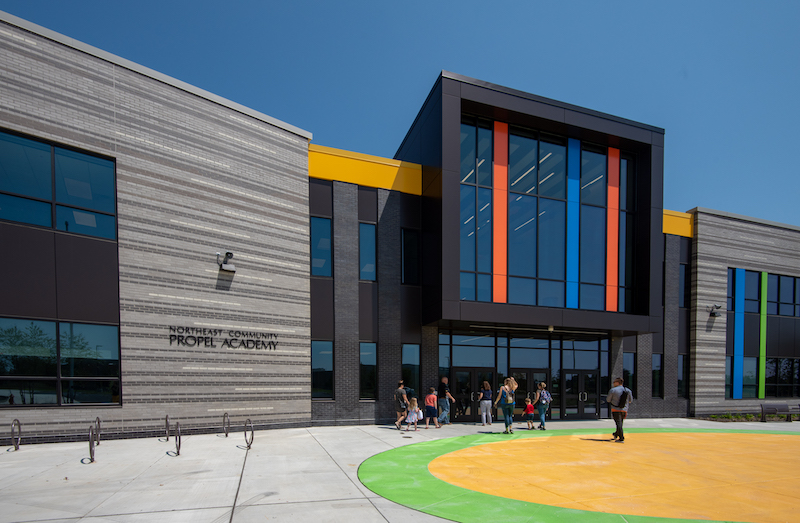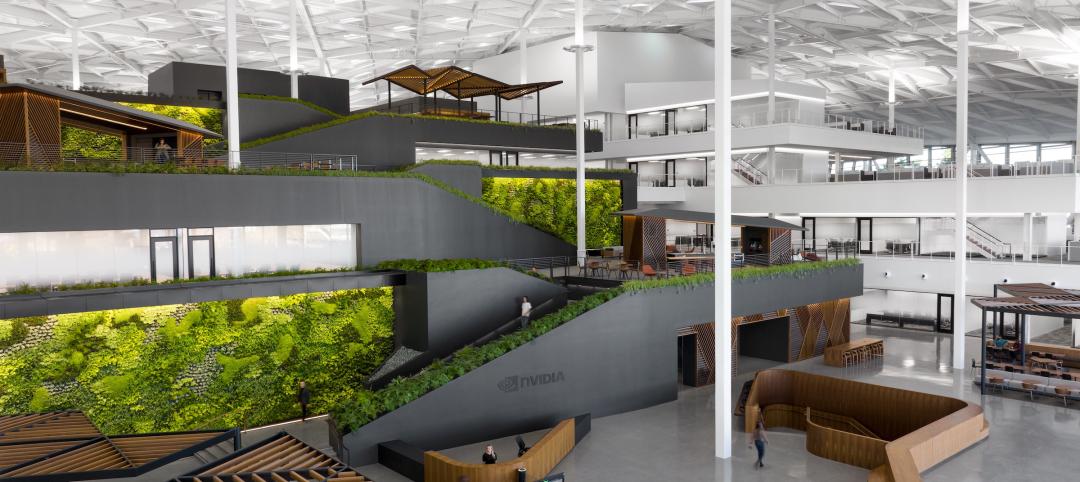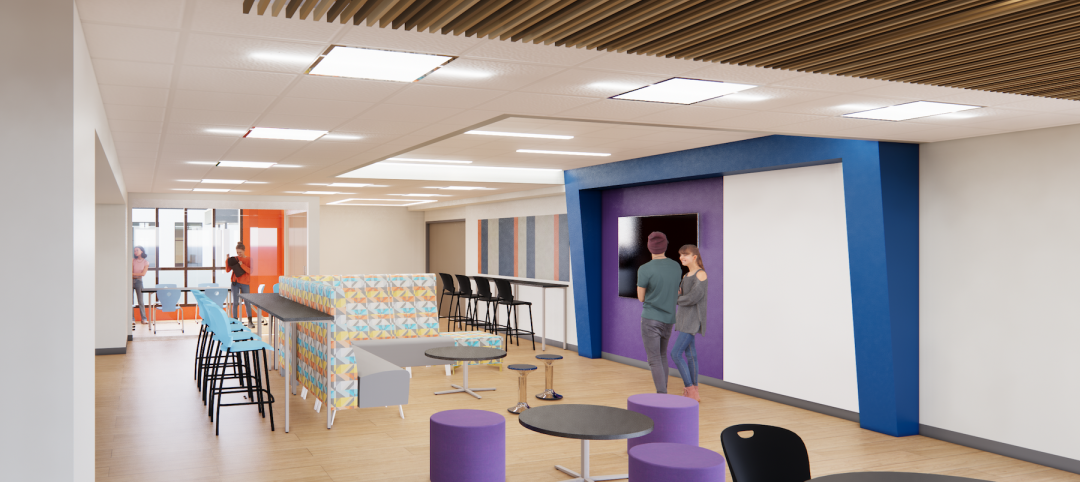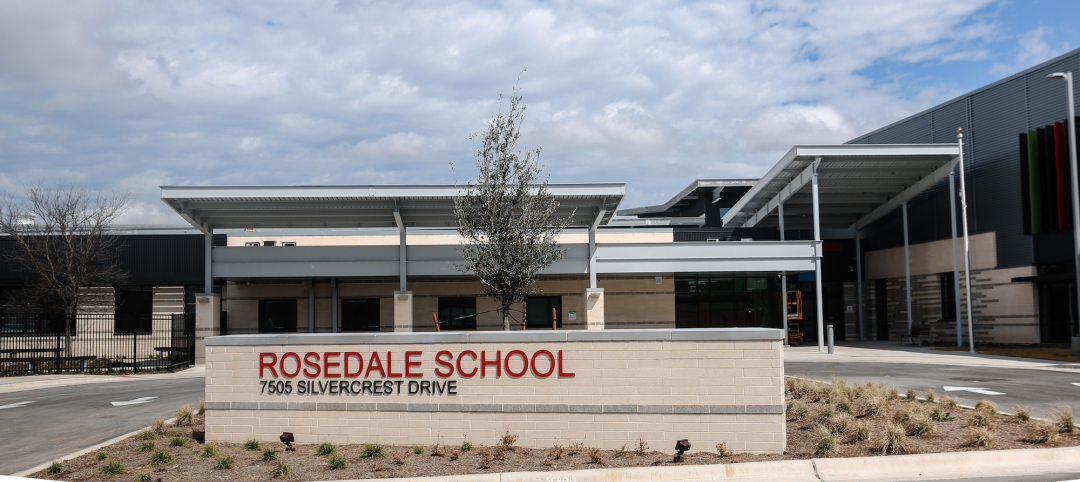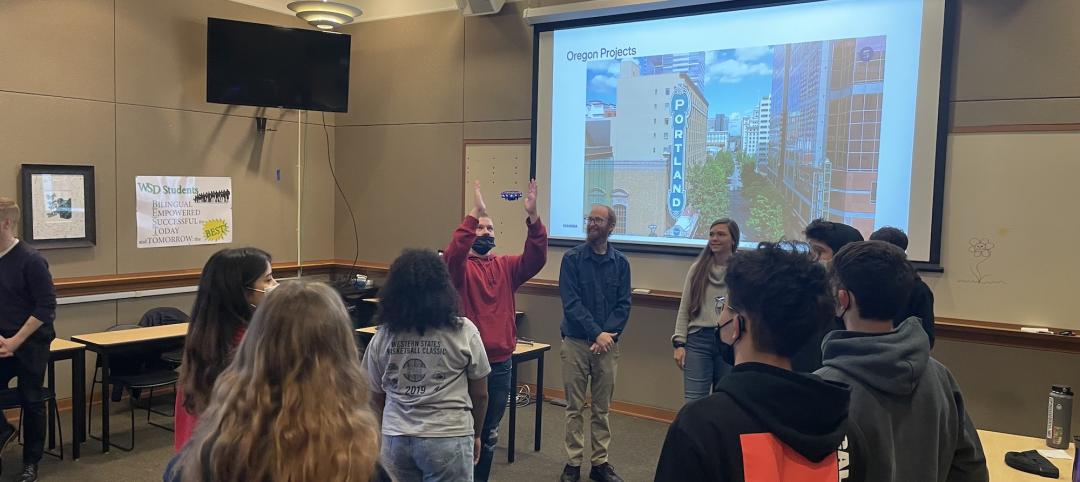Last Tuesday, the Northeast Community Propel Academy, a K-8 school with the capacity for 1,660 students, opened In Philadelphia. The 180,000-sf building was financed and constructed through a public-private partnership between the School District of Philadelphia and Gilbane Development Company, which provided turnkey development for the new school.
Gilbane Building Company acted as the project’s design-builder and hired Stantec as its architect. Gilbane was one of three firms that submitted bid proposals to the school district in the fall of 2017, and received the contract the following January, says Susan Tully, Senior Project Manager and Market Leader for Gilbane’s K-12 Center of Excellence. The school’s design was completed by October 2019, and after some municipal delays construction began in March 2020, “on the day the world stopped” because of the coronavirus pandemic, quipped Tully.
Propel Academy is in a multicultural section of Philadelphia that “is booming,” says Tully, with lots of service sector workers. But the number of school seats hadn’t kept pace with the community’s growth; Tully notes that another school there, built for 600 students, now serves 2,000. The district “knew they need to get a new school built quickly,” she recalls.
The school is on land that previously had served as baseball and softball fields. As part of the P3 agreement, Gilbane Development purchased the land from the school district for $1, and upon completion of construction on August 19, 2021 sold the property and school back to the school district for $79 million.
“Speed to market was a driver” for the P3 arrangement, says Luis Vildostegui, Stantec’s Senior Principal and Education Leader, whom BD+C interviewed with Jennifer Grafton, Stantec’s Project Manager and Senior Associate. Vildostegui notes that Propel Academy’s design reflects the school district’s gravitation toward a more socialized teaching model that focuses on learning with peers.
SCHOOL FEATURES COLLABORATIVE ZONES
Gilbane and Stantec, with Fengate Asset Management, were part of a construction financing consortium that in June broke ground on six K-12 schools in Prince George’s County, Md. This was the first P3 for schools in the nation, and it’s expected to cut in half the time it takes to complete those schools, which are scheduled to open in 2023.
In Philadelphia, the Propel Academy project “is one of the most collaborative I’ve worked on in my career,” says Tully. One of its advantages was Gilbane’s relationship with Stantec, which provided architecture, interior design, and civil engineering services. “We were able to advance the construction before the designs were completed, which fast-tracked the project,” says Grafton. And because Stantec had worked previously with the school district and Gilbane, “we could act as an intermediary” when decisions were made, says Vildostegui.
Stantec’s office in Philadelphia is right across the street from the school district’s, so it set up a big room where all of the project’s stakeholders could meet conveniently. “We were all there, resolving problems from the beginning,” says Vildostegui. Any additions or changes during the design or construction process had to be “cost-neutral solutions,” says Tully. (Nicole Ward, AIA, the school district’s design manager, was its liaison on this project.)
Those discussions included “challenging some basic assumptions,” says Vildostegui, like the building’s placement, which is adjacent to a park that exposures city kids to natural environments they might not see otherwise. During the permitting stage, the building team and school district also hashed out whether a retention basin on the site should be above or below ground (they ultimately chose the latter).
The building team’s early collaboration allowed its members to react quicker when there were materials shortages or delays. “We didn’t need to make compromises,” says Tully.
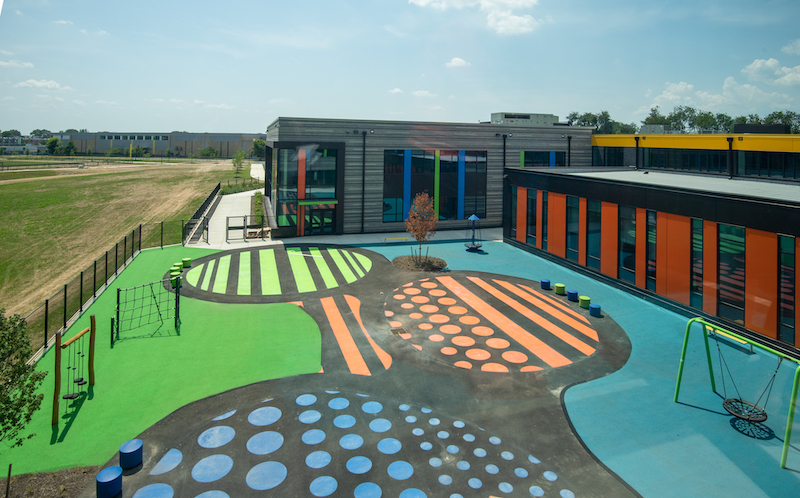
The Propel Academy was build on land that once served as ball fields, and is located near a tree-lined park.
A ‘SHINING SUCCESS STORY’ FOR P3s
Propel Academy is organized into clusters of classrooms and collaborative zones for small learning groups. There are six classrooms per grade for grades 1-5, and nine classrooms per grade for grades 6-8. The classrooms are positioned around shared media and tech commons within each grade level house, and the number of classrooms can be adjusted as needed.
The school also has science labs, music rooms, and “exploration” spaces, says Grafton. “It’s transformative,” says Vildostegui about the school’s design, that had to meet what Tully calls the school district’s “strict design standards” that are informed by LEED and WELL guidelines.
Tully sees Propel Academy as a “test case” for the school district, and believes P3 financial agreements will be more in vogue for financing school construction to meet clients’ demands for speed. “It’s a shining success story” for the P3 approach, adds Vildostegui. “It’s not for every project, but it’s quicker than a traditional design-bid-build because the issues get moved upfront.”
Related Stories
Giants 400 | Aug 22, 2023
Top 115 Architecture Engineering Firms for 2023
Stantec, HDR, Page, HOK, and Arcadis North America top the rankings of the nation's largest architecture engineering (AE) firms for nonresidential building and multifamily housing work, as reported in Building Design+Construction's 2023 Giants 400 Report.
Giants 400 | Aug 22, 2023
2023 Giants 400 Report: Ranking the nation's largest architecture, engineering, and construction firms
A record 552 AEC firms submitted data for BD+C's 2023 Giants 400 Report. The final report includes 137 rankings across 25 building sectors and specialty categories.
Giants 400 | Aug 22, 2023
Top 175 Architecture Firms for 2023
Gensler, HKS, Perkins&Will, Corgan, and Perkins Eastman top the rankings of the nation's largest architecture firms for nonresidential building and multifamily housing work, as reported in Building Design+Construction's 2023 Giants 400 Report.
K-12 Schools | Aug 7, 2023
Two new school projects part of larger district-wide improvement plans
Gladstone Elementary in Rhode Island, and Plum Grove Middle School in Illinois, reflect trends toward collaboration and consolidation.
Market Data | Aug 1, 2023
Nonresidential construction spending increases slightly in June
National nonresidential construction spending increased 0.1% in June, according to an Associated Builders and Contractors analysis of data published today by the U.S. Census Bureau. Spending is up 18% over the past 12 months. On a seasonally adjusted annualized basis, nonresidential spending totaled $1.07 trillion in June.
K-12 Schools | Jul 31, 2023
Austin’s new Rosedale School serves students with special needs aged 3 to 22
In Austin, the Rosedale School has opened for students with special needs aged 3 to 22. The new facility features sensory rooms, fully accessible playgrounds and gardens, community meeting spaces, and an on-site clinic. The school serves 100 learners with special needs from across Austin Independent School District (ISD).
Market Data | Jul 24, 2023
Leading economists call for 2% increase in building construction spending in 2024
Following a 19.7% surge in spending for commercial, institutional, and industrial buildings in 2023, leading construction industry economists expect spending growth to come back to earth in 2024, according to the July 2023 AIA Consensus Construction Forecast Panel.
School Construction | Jun 29, 2023
K-12 school construction: 5 ways strong community relations can lead to success
When constructing a K-12 school, building positive relationships with the community—including students, parents, school staff and residents—is critical to the success of the project. Here are five ways Skanska puts the community first when building K-12 schools in the Pacific Northwest.
Standards | Jun 26, 2023
New Wi-Fi standard boosts indoor navigation, tracking accuracy in buildings
The recently released Wi-Fi standard, IEEE 802.11az enables more refined and accurate indoor location capabilities. As technology manufacturers incorporate the new standard in various devices, it will enable buildings, including malls, arenas, and stadiums, to provide new wayfinding and tracking features.
Engineers | Jun 14, 2023
The high cost of low maintenance
Walter P Moore’s Javier Balma, PhD, PE, SE, and Webb Wright, PE, identify the primary causes of engineering failures, define proactive versus reactive maintenance, recognize the reasons for deferred maintenance, and identify the financial and safety risks related to deferred maintenance.


